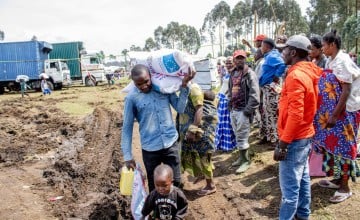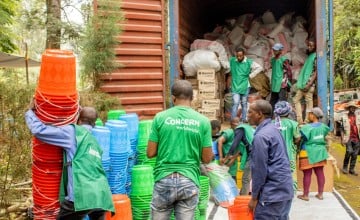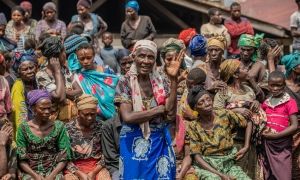
Read our 2024 annual report

Knowledge Hub
Responding to a Shifting Crisis: Rethinking Support for Displaced People and Their Hosts in DRC
When we think of displacement, whether internal or across borders, we often picture refugee camps or informal settlements. Yet, these visible sites accommodate less than half of the world’s forcibly displaced population.[1] What is less widely recognised, is the vital role played by local solidarity networks that swiftly mobilise to provide temporary shelter to hundreds of thousands affected by conflict or disaster. Long before government or humanitarian aid arrives at scale, community members act as first responders—opening their homes and offering crucial support to those in need.[2]
The Democratic Republic of the Congo (DRC) is no exception. For over 25 years, a protracted crisis, particularly in the eastern provinces, has forced millions to flee in search of safety. Today, 1 in 20 Congolese is displaced,[3] with close to 7 million internally displaced persons (IDPs),[4] most fleeing ongoing violence and conflict.[5] While striking images of vast displacement sites around Goma, which sheltered over 600,000 people in 2024, captured international headlines, host families have also consistently played a central role in the response, offering shelter and stability throughout crisis.
The recent escalation of conflict in eastern DRC in early 2025 resulted in the seizure of large parts of North and South Kivu. The subsequent closure of dozens of displacement sites has forced hundreds of thousands of people to seek refuge in the homes of local community members. This has further reinforced the importance of host families, who continue to serve as a backbone of local response efforts, despite limited resources and little external support.

The renewed displacement crisis in North Kivu
In territories under the influence of de facto authorities, IDPs were encouraged to vacate the sites they had been sheltering in, following statements that their home areas were now considered secure and suitable for return. These directives led to the abrupt and unprepared departure of nearly 900,000 people, mostly in North Kivu.[6]
Many of those who attempted to return home found their land occupied,[7] compounding their vulnerability. Early assessments indicate that around 80% of the newly displaced are now being hosted by local families within local communities, although population movements are still ongoing.[8]
How hosting works in practice
Hosting displaced people can take many forms. In some cases, families offer space on their land for displaced households to construct temporary shelters. Others share part of their home, allocating a room, an outbuilding, or even an entire secondary dwelling. Some hosts live with the displaced under the same roof, sharing already limited space and resources.[9] These hosts may be relatives, distant family members, friends, acquaintances, or even complete strangers.[10] The decision to host is shaped by a range of reasons, many cite compassion and solidarity as key motivations.[11] Cultural norms of hospitality, a sense of moral duty, shared experiences of displacement, or a sense of reciprocation of assistance also play a significant role in this decision.[12]
In a context where 73.5% of the population lives on less than $2.15 per day[13] and over 10 million people in the 4 eastern provinces face acute food insecurity[14] sharing limited resources is no small undertaking. Yet, many households continue to host, underscoring the critical but often under-recognised role of host communities in the broader displacement response.

Challenges
Years of conflict and recurring crises have left communities in eastern DRC deeply vulnerable. Many displaced families have fled violence, leaving behind homes, belongings, and farmland, and return to find their property damaged, occupied, or inaccessible. In some areas, fields remain untended, homes have been destroyed, and public infrastructure has collapsed, contributing to a vicious cycle of poverty and insecurity. Violations of property rights remain a frequent issue, accounting for 30.2% of all incidents recorded by the Protection Cluster. Land conflicts alone represent 2.8% of reported incidents[15], further complicating efforts for safe return and durable solutions.
In this fragile context, the arrival of displaced families places additional pressure on already overstretched services and limited resources such as healthcare, water, and sanitation. Hosting displaced families can heighten food insecurity, strain social support systems, and further erode the resilience of communities already facing chronic hardship. [16] These pressures, if not properly addressed, risk creating or exacerbating tensions between host families and those they shelter. This risk increases when humanitarian assistance is seen as favouring displaced populations without sufficient support for host communities, potentially leading to resentment or conflict.[17]
Over time, the strain on households may lead to harmful coping strategies such as selling assets, withdrawing children from school, or relying on unsafe or unsustainable livelihoods. For humanitarian responses to be effective and sensitive to the context, they must respond to the shared and interconnected needs of both displaced individuals and the families hosting them, in order to support stability and social cohesion.
Concern's approach
The sudden and unplanned evacuation of displacement sites has placed considerable pressure on host communities, many of whom were neither prepared for, nor supported through, the transition. While humanitarian organisations have provided support to host families, much of the response to date has focused on displacement sites, where needs were more visible and concentrated. As the context shifts, it is increasingly important to adapt humanitarian approaches to reflect current realities, ensuring that communities who are welcoming displaced families receive the support needed to sustain this solidarity.
In the DRC, Concern is already adapting its approach. We are broadening our programmes to reach the most vulnerable host families alongside displaced households, recognising that both groups are deeply affected by the ongoing displacement dynamics.
This includes scaling up activities we previously implemented to support host communities, such as providing direct assistance through distributions or cash transfers to both displaced individuals and the families hosting them. Additionally, we are expanding efforts to rehabilitate and enhance key infrastructure through WASH interventions, such as repairing water systems and public latrines, as well as building household-level facilities like family latrines, waste pits, and water taps. This area-based approach aims to serve the broader community, reduce the risk of service collapse, and promote dignity and stability for both displaced people and their hosts, adapting to the evolving context.
Moreover, Concern teams have observed that when services benefit both IDPs and host communities, acceptance of interventions improves, and the risk of tension or marginalisation is reduced, leading to safer, more inclusive outcomes for everyone involved. To further enhance sustainability, Concern also invests in training individuals across host communities, returnees, and IDPs, such as through the establishment of water management committees and the mobilisation of community health volunteers, ensuring that local actors are equipped to manage and maintain key services in the long term.

Conclusion
The ongoing crisis in the DRC underscores the critical role that host communities play in responding to displacement. As displacement continues to affect millions, humanitarian responses need to adapt to address the emerging challenges. At Concern, we are actively adjusting our programming to meet these evolving needs, ensuring that both displaced individuals and their host families receive the support they need, recognising both groups as essential to an effective and dignified response.
By prioritising area-based, inclusive approaches that strengthen fragile services and alleviate pressure on vulnerable communities, we are working toward a response that is more effective, equitable, and sustainable. This is not just a matter of fairness: it is essential to addressing the scale and complexity of the crisis and to preventing rising tensions between groups sharing limited resources. As the context continues to evolve, Concern remains committed to responding flexibly, ensuring that those most affected by the crisis are not left behind.
Related Resources
[1] Davies, Anne, IDPs in Host Families and Host Communities: Assistance for hosting arrangements - The CALP Network, April 2012
[2] UNHCR , Hosting arrangements | UNHCR, September 2024
[3] OCHA, DRC Humanitarian Needs and Response Plan, 2025
[4] IOM DTM, DRC – Internal Displacement Overview 2024, November 2024
[5] IOM DTM, DRC – Internal Displacement Overview 2024, November 2024
[6] UNHCR, Displacement in Eastern DRC and Neighbouring Countries, Two-Month Impact Report, February - March 2025.
[7] Eastern DRC and Neighbouring Countries: Two-month Impact Report | Global Focus
[8] IOM, DRC – Rapid Displacement Analysis, North Kivu and South Kivu (3-11 March 2025) | Displacement Tracking Matrix, April 2025
[9] Caron, Cynthia Hosting the displaced – and being hosted - Forced Migration Review
[10] UNHCR , Hosting arrangements | UNHCR, September 2024
[11] Rohwerder, Brigitte, Democratic Republic of the Congo: Internally displaced persons and refugees’ relations with host communities (2013)
[12] Caron, Cynthia Hosting the displaced – and being hosted - Forced Migration Review
[13] World Bank, Democratic Republic of Congo Overview: Development news, research, data | World Bank, April 2025.
[14] World Food Programme, Democratic Republic of the Congo | World Food Programme
[15] Cluster Protection RDC, Points Saillants de Protection, March 2025
[16] Rohwerder, Brigitte, Democratic Republic of the Congo: Internally displaced persons and refugees’ relations with host communities (2013)
[17] UNHCR , Hosting arrangements | UNHCR, September 2024




